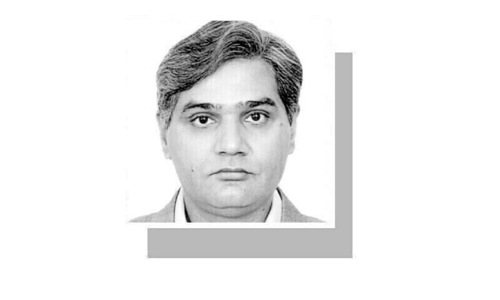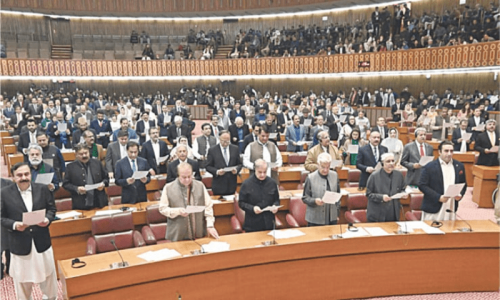CHICAGO: More than 50 world leaders were gathering in Chicago for one of the biggest Nato summits in history Sunday aiming to hammer out a unified exit strategy from Afghanistan after a decade of war.
A huge security operation has swung into place in the hometown of US President Barack Obama, with police deployed along the main arteries, some on horseback, as Coast Guard boats topped with machine guns patrol the river.
It is the first summit of the 28-member North Atlantic Treaty Organization on US soil in more than a decade, and follows a two-day summit of G8 leaders hosted by Obama in the seclusion of Camp David, Maryland.
In a sign of the heightened tensions, authorities in the Windy City, already bracing for massive protests, Saturday charged three men with plotting to attack Obama's campaign headquarters and other targets during the summit.
Despite a myriad of issues facing the 63-year-old organization founded in the wake of World War II as it confronts shifting 21st century realities, the Chicago summit is set to be dominated by Afghanistan.
Obama arrived back in his hometown late Saturday, met by cheering crowds who lined the route as his motorcade rode downtown.
Among the world leaders at the table with Obama will be Afghan President Hamid Karzai and his Pakistani counterpart Asif Ali Zardari, who accepted a last-minute invitation to attend the talks.
Despite the stubborn Taliban insurgency, war-weary international forces are seeking to hand control of security to Afghan forces while withdrawing some 130,000 foreign combat troops by the end of 2014. Karzai comes armed with a firm demand for $4.1 billion a year to fund his security forces after the pullout — fearing his country could descend into a new civil war.
The United States is expected to foot half the bill while hoping the international community will stump up the rest.
Washington is also hoping that Zardari will agree to reopen key Nato supply routes into Afghanistan closed down in November after US air strikes killed 26 Pakistani troops.
However, US Defense Secretary Leon Panetta suggested in an interview with the Los Angeles Times that Islamabad was demanding too high a price to resume the deliveries across its territory.
Quoting a senior US official, the daily said Islamabad now wanted $5,000 per truck, compared with $250 previously, amounting to a goodly sum for the thousands of trucks which trundle across the border daily.
“Considering the financial challenges that we're facing, that's not likely,” Panetta told the daily.
Pakistan's cooperation however is seen as key to the success of the international mission in Afghanistan, as US-led Nato forces fight a fierce Taliban insurgency.
“We can't solve the problems in Afghanistan without the positive engagement of Pakistan,” Nato Secretary General Anders Fogh Rasmussen said Saturday.
The White House was hoping the issue of the supply routes would soon be resolved, said deputy national security adviser Ben Rhodes on Saturday.
“Based on the statements they've made, the negotiations going on, we believe it's going to be accomplished,” he told reporters traveling with Obama. “We're not anticipating necessarily closing out those negotiations this weekend.” Indeed, planned talks between Rasmussen and Zardari were abruptly called off late Saturday, officially because the Pakistani leader's flight was late arriving from London. Both sides said they hoped to reschedule the meeting.
France's new President Francois Hollande has meanwhile shaken up the carefully crafted transition plan, vowing to bring his 3,500 combat troops home in 2012, a year earlier than planned.
Obama and his fellow leaders will take other key decisions, activating the first part of a missile shield for Europe and announcing a slew of military cooperation projects to cope with mounting austerity.
Governments are feeling the pinch as Europe's debt crisis forces budget cuts across the board, and to cope Nato will announce more than 20 joint projects to pool military hardware as part of a so-called “Smart Defense”initiative.
Nato has touted a planned US-led missile shield for Europe as a shining example of military cooperation. A first step to the shield will be the announcement at the summit of an “interim capability” putting US warships armed with missile interceptors in the Mediterranean, and a radar system based in Turkey under Nato command.















































